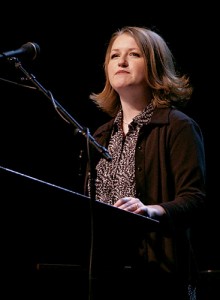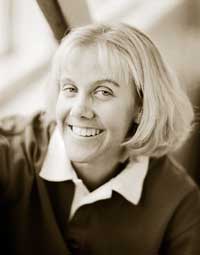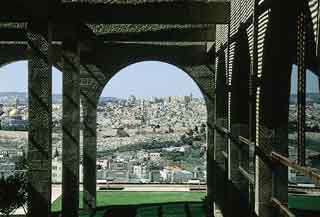
Brynna Wilson Haddock, ’03, winner of the 2002 George H. Brimhall Memorial Essay Contest, reads her winning essay at Homecoming opening ceremonies, Oct. 15 2002.
By Brynna Wilson Haddock, ’03
The annual George H. Brimhall Memorial Essay Contest honors a BYU founder as part of Homecoming each year. Brynna Wilson Haddock, ’03, a senior from Reno, Nev., majoring in elementary education, won first prize in the 2002 contest and received $1,000 for her 1,000-word essay, which she presented at Homecoming opening ceremonies. A condensed version of her essay is printed here. Also winning awards in the contest were Callie Buys, ’04, (second place) and Rebecca Findlay Lloyd, ’04, (third place). Lisa Eastmond, ’03, and Ann Marie Toone, ’03, received honorable mentions. The theme for Homecoming 2002 was “Alive in You” and the honored founder was Benjamin Cluff Jr.
AS April 2003 approaches and my graduation looms, my reflections settle on the person I have become through attending Brigham Young University. I can attribute my gains somehow to BYU and in turn to its founders, who gave of themselves to make this institution what it is today and to ensure these experiences for me.
Meager resources and poor conditions, financial and otherwise, characterized the humble beginnings of Brigham Young Academy. However, our founders looked beyond and persevered through adversity because they understood the academy’s crucial role, which Karl G. Maeser outlined at the first Founders Day exercises:
A glance over the conditions of mankind in this our day . . . shows that this generation has been put into the balance and has been found wanting. A following, therefore, in the old grooves, would simply lead to the same results, and that is what the Lord has designed shall be avoided in Zion. President Brigham Young felt it in his heart that an educational system ought to be inaugurated in Zion in which . . . neither the alphabet nor the multiplication table should be taught without the Spirit of God. [“History of the Academy,” reprinted in John W. Welch and Don E. Norton, eds., Educating Zion (Provo: BYU Studies, 1996), p. 2]
The founders of the academy, Benjamin Cluff Jr. in particular, recognized its shortcomings but met them with reform rather than disdain. Cluff was a champion of the school. Under his principalship, the academy became Brigham Young University and Cluff its first president. Many of his educational reforms are still in effect today. He extended class periods from 30 to 60 minutes, implemented summer school, and encouraged students and faculty to pursue higher education beyond BYU.
As an educator myself, I can personally appreciate the power, patience, and incredible conviction that educational reform requires. Not just any man could have implemented so many changes in such a short period of time. Cluff “was a strong and resourceful leader . . . a man to be reckoned with—a good organizer, fearless, and aggressive,” said Bryant S. Hinckley, one of his students. These strengths, coupled with his conviction to keep the spirit of BYU alive in his heart, empowered him to make a difference at the university.
I believe Benjamin Cluff instituted the Founders Day tradition because he understood that as we remember and honor those who utilized their Brigham Young University experience to improve BYU, we recognize that the real reason to keep BYU alive in us is not for our own personal benefit. It is for the benefit of others. We can utilize what we gain here not only for our own betterment but for the betterment of BYU. Our founders knew how to keep the spirit of BYU alive in their hearts by giving back to this institution what they had gained from it. We can emulate that. President Gordon B. Hinckley has told us that “life is a great chain of generations,” link following link, until the end of time. He has urged us to be a strong link.
I will never take a class from Benjamin Cluff Jr. I will never even shake his hand. But I can honor him by emulating how he kept BYU alive in his heart: through his actions. I can pass on my love for learning. I can be an active part of my community. I can have the courage and conviction to implement needed reform. The spirit of BYU alive in my heart can be manifested through my actions. May we answer the call from voices past that challenge us to stand as a strong link for future generations by keeping BYU alive in us.
INFO: Todd Hendricks, 801-422-7621 or todd_hendricks@byu.edu









